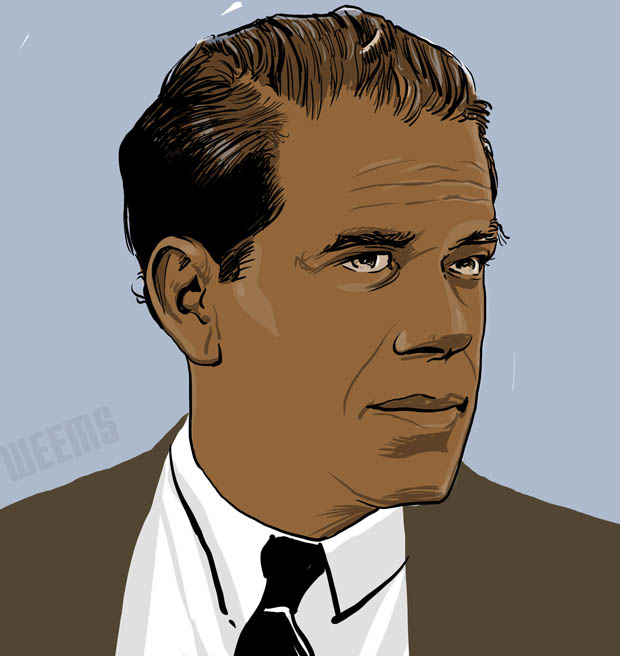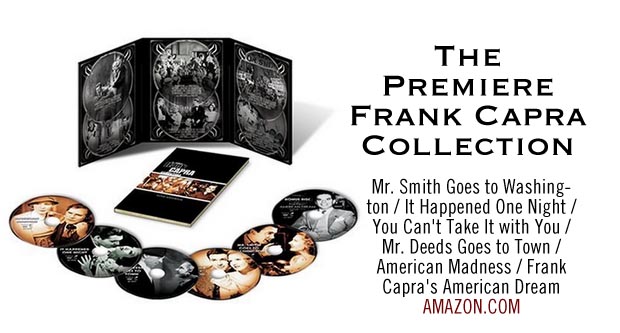Mr Deeds Goes to Town 1936
"People here are funny. They work so hard at living - they forget how to live. Last night, after I left you, I was walking along and looking at the tall buildings and I got to thinking about what Thoreau said. They created a lot of grand palaces here - but they forgot to create the noblemen to put in them."
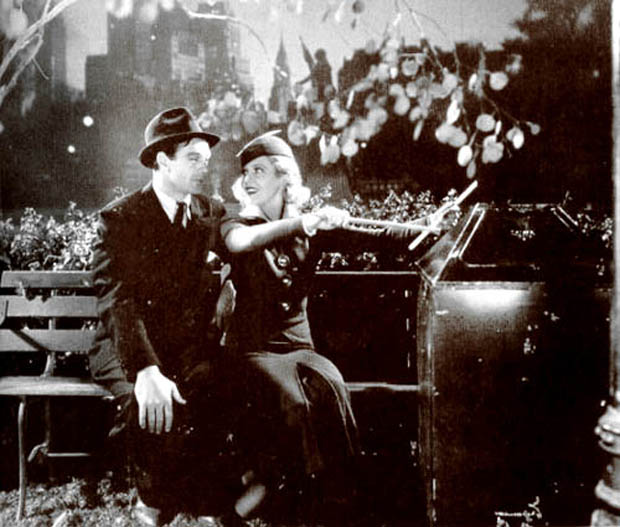
LONGFELLOW DEEDS lives in a small town, owns a tallow works, and earns income as a writer of sentimental poems for greeting cards. He suddenly inherits 20 million dollars when a distant uncle dies in an automobile accident. When told how much the inheritance is from his dead uncle's shyster attorney, Mr. Deeds pauses for a moment from practicing on his tuba and deadpans back, "I wonder why he left me all that money? I don't need it." Maybe not, but everybody he meets on a trip to New York City wants it, and how they all try to get their hands into his pockets and how he finally decides to give it away is told in a fast-paced humorous way.
Streaming and HD
DVD AVAILABILITY
Single Disk DVD
Also part of the Capra Premiere Box Set
1936 Review
(A May 1936 review of MR. DEEDS from the National Board of Review magazine is here.)
FILM NOTES
(Joseph McBride's FRANK CAPRA: THE CATASTROPHE OF SUCCESS figures greatly in compliling the facts I've put together here..)
The original source for the film came from Clarence Budinton Kelland's "Opera Hat," about a greeting card poet from Mandrake Falls, Vermont, who inherits several million dollars and an opera house in New York City. The story ran as a serial in American Magazine. Incidentally, a running joke in the film is Mr. Deeds inability to find a rhyme for "Budington," one of the names of the attorneys who represented his deceased uncle.
Capra had originally started out in 1935 to make a film about George Washington called Valley Forge. When this did not come about, he also was involved in trying to put together film versions of Crime and Punishment, and Anna Karenina (this latter project he also sought to revive for Sophia Loren in 1962). He also worked on a proposal of Pagliacci, about the tragedy of a circus clown; and also began thinking of filming James Hilton's Lost Horizon, which Capra did in 1937.
Carole Lombard turned down an offer to portray Babe Bennet in Mr. Deeds. Instead she choose to be in My Man Godfrey. (She later married It Happened One Night's star, Clark Gable.)
Frank Capra wrote a short story called "The Butler's Adventure" while in a college English course in 1916. A crazed butler, driven by poverty to murder his millionaire employer, somewhat resembles the displaced farmer played by John Wray in Mr. Deeds.
Mr. Deeds Goes To Town cost $806,774 to make, a 5 percent over budget cost. Capra shot over 150,000 feet of film, only 1/15th of which appears in the final edit. In it's first run release, Mr. Deeds Goes To Town earned Columbia Studios $1,040,767. Capra was paid an annual salary of $159,500 at the time.
In March of 1936, Capra purchased a house across the road from his Mr. Deeds star, Gary Cooper, in Brentwood, California.
Frank Capra won his second directorial Oscar on March 4, 1937, for Mr. Deeds Goes To Town.
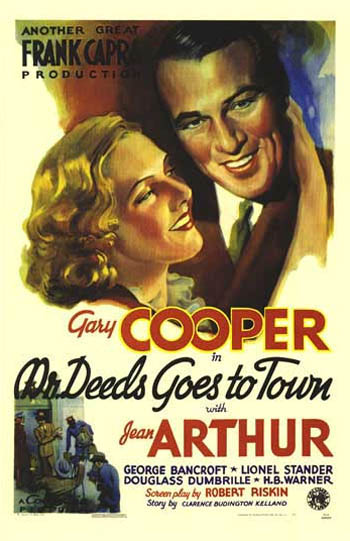
The New York Film Critics chose Mr. Deeds as the best film of 1936.
Robert Riskin, Capra's frequent co-creator on his films, said Mr. Deeds was his favorite of the films they made together.
Mr. Deeds Goes To Town was retitled Mr. Dietz Goes to Town, and later, Grip of the Dollar in it's releases in the Soviet Union.
Film critic Pauline Kael wrote: "Frank Capra destroyed Gary Cooper's early sex appeal when he made him childish as Mr. Deeds." Cooper, near the end of his life, credited Capra with getting his best performances for Mr. Deeds and Meet John Doe.
The scene in the film in which Babe Bennet (Jean Arthur) reads the poem Longfellow Deeds has written for her originally had a different ending. In the earlier version, Deeds ran away and leaped aboard a horse-drawn wagon to sing a duet with an Italian garbageman. Capra's gagman training from his years of working for Hal Roach and Mack Sennett came into play, and he improvised instead pratfalls where Deeds stumbles over garbage cans in his panic to escape.
"Variety registered a complaint that the rant of the desperate farmer (played by John Wray), who denounces the headline antics of Longfellow Deeds ("I just wanted to see what a man looked like that could spend thousands of dollars on a party when people around him were hungry!"), amounted to a "quasi-Communistic" propaganda. Some thought Mr. Deeds was not so much a Communistic statement as a Capra-Riskin endorsement of the New Deal. Others thought it merely a feel-good escapist movie that was even faintly Republican in its simple solutionism."
"The Debate has not really waned. Capra's films tended to "break political ' rules' and splice ideologies together," wrote Donald C. Willis in The Films of Frank Capra. "Depending on one's political point-of-view and on what Capra film or films or parts of Capra films one is talking about, Frank Capra is an advocate of Communism, fascism, Marxism, populism, conservatism, McCarthyism, New-Dealism, anti-Hooverism, jingoism, socialism, capitalism, middleof-the-roadism, democracy or individualism. It's no accident that there are so many interpretations of his films."
(From the introduction to Six Screenplays by Robert Riskin, edited by Pat McGilligan, page 44-45)
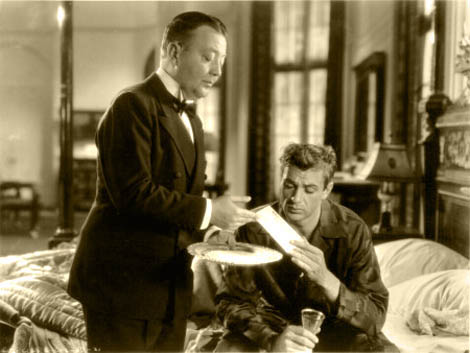
MR. DEEDS GOES TO TOWN 1936
Produced and Directed by Frank Capra.
Script by Robert Riskin (and Myles Connolly, uncredited).
From the story "Opera Hat" by Clarence Budington Kelland.
Cinematographer: Joseph Walker.
Length: 115 minutes.
10,617 feet of film; 12 reels
Release Date: 12 Apr 1936
Premiere Information: not available
Production between December 13, 1935 and February 5, 1936
Filmed in Black and White
Sound by Western Electric Noiseless Recording
More info coming
Original page 1998 | Updated April 2013
